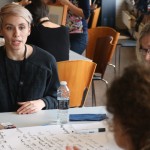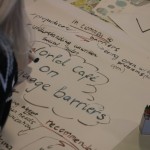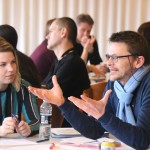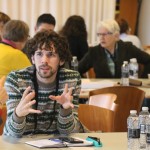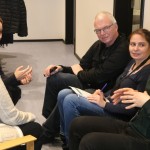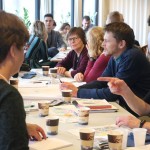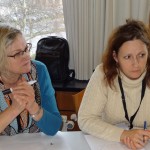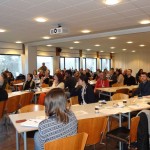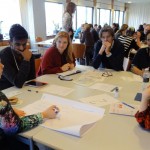How to overcome integration barriers – representatives of the Rēzekne municipality participate in an international conference in Denmark
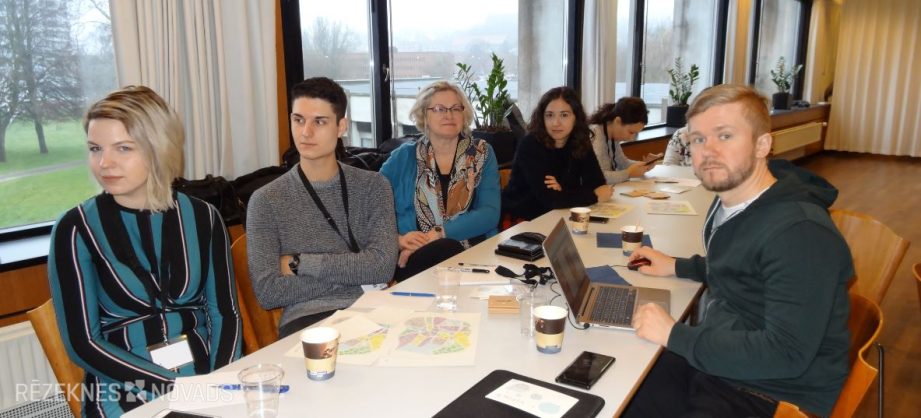
Representatives of the municipality of Rezekne - co-ordinator of the project CRISCO, external communications specialist Inta Rimšāne, public relations specialist Diana Selecka, Griškānu parish youth specialist Igors Isupovs, commercial activity specialist May Hartmane and Kaunatas secondary school pupil toni Angelo Fernandes participated in the INTERNATIONAL conference “Language barriers - barriers to integration of persons in society” in Vejle, Denmark. On the first day of the conference, the participants met, then each member was invited to visit the Danish family. On the second day of the project, work was carried out in groups to tell how each of the project Member States helps to address language problems and better integrate into society. On the last day, the next conference was gathered to prepare for the next conference.
The participants of the event were addressed by Jens Ejner Christensen, head of the municipality of Vejles, who said that Danish representatives were pleased to welcome representatives of the various countries, as well as told about Vejli, which is the sixth largest municipality in Denmark.
The Hartmane of May, who knew very well the problem of language barrier, because at the age of 10, began to study at the British school, without knowing English, acknowledged that the subject of the conference was topical: in my case, the subject of the conference concerned the experience of life because i was in direct contact with the problems that arise because of the language barrier when i emigrated to England. The topic of the language barrier is very topical as in Latvia, the whole of Europe.
It was very interesting to share experiences with delegations from other Member States and to draw inspiration from what each country's approach to addressing problems is. During the first day project presentations, various solutions were offered to topics that were topical for this conference. For example, the Danish delegation showed that the inter-school project, where all pupils speak in their national language, can cope with nations and break language barriers simultaneously.
All the lectures and workshops were very well-thought and interesting, and the stories of other people's experiences were exciting, making it possible to go into themes through practical examples of life.
The use of different ideas and working instruments to overcome language barriers to more effective social integration within minority groups seemed very interesting.
Similarly, a variety of effective communication approaches to address everyday problems, as well as new ideas for projects that would help to include those who do not have a native language.
The difference in cultures, how problems are addressed, the approach to work; the punctuality and professionalism of Danish in all areas of work. '
Griškānu parish youth specialist Igors Isupovs meets the problem of language barrier in his day-to-day work: “There are cases in Latvia where one of the main obstacles to the quality of daily life is the lack of language knowledge.
In order to reduce language barriers, complex measures must be taken and citizens must cooperate. Both the state and the public and the person with language problems that create integration problems must be interested in finding solutions. If any of the above steps are not motivated and no interest is shown, the probability that a significant result will be achieved will be quite low. It is therefore important to develop strategically correct language barrier mitigation measures that can contribute to the participation of all sections of society in addressing this issue.
In the future, organising conferences, events related to the reception of guests from abroad or other regions of Latvia, would certainly like to involve local people in these types of events, giving the opportunity to explore the experience of other people, thereby expanding the vision.
We have the most lack of communication at all levels in Latvia. Latvian society should focus more on common problems affecting the majority of society and to be active in addressing these issues.
The local resident had the opportunity to apply for a conference and co-operate with the PARTICIPANTS of THE CRISCO project from various European countries. The activity of local people and the interest in participating in the conference were amazed. '
THE Kaunatas secondary school pupil in Angelo Fernandes comes from a two-language family, while the day-to-day communication of both Latvian, Latvian and Latvian, both Russian, French and English, acknowledges that there was new knowledge of integration issues and barriers: the theme of the conference was related to today's problem – a language barrier that hinders the integration of people into society. I was surprised by the diversity of situations in countries that are solutions to overcoming language barriers, how different people experience. The most interesting part of the conference was the communication with the Danish people who had to be integrated into Danish society.
I have gained new knowledge of the social situation in different countries. I listened to the experience of people's integration.
There is a lack of willingness in Latvia to help people with problems with integration into society. I am aware that we must be tolerant of foreigners or other people who do not feel safe in society, so i will try to help such people. '
External Communications Officer Inta Rimšāne acknowledges that the CRISCO project makes people think that we can help not only ourselves but also the others: “there are many people around us who need help – the surrounding, neighbours, co-workers, but the most people who have problems in society – ethnic minorities, people with special needs. We are accustomed to getting help from others, but we must learn to help others. Helping others also make our society better."
THE project CRISCO operates eight European national governments from Belgium, Denmark, Estonia, Italy, Latvia, Lithuania, the Netherlands and Slovenia. All the municipalities involved have different ethnic, social, formal and informal groups who often have limited information for each other. The lack of information often leads to different prejudices or even the isolation of a group.
The final conference of the project will be held in June in Belgium and its theme will be “language barrier - barrier integration”.
Diana Selecka Text and Photo
Project Publisher photo
